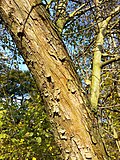Malus sylvestris
Malus sylvestris, also known as the European crab apple, is a species of the genus Malus, native to Europe. Its scientific name is derived from the Latin words 'malus', meaning 'apple', and 'sylvestris', meaning 'forest'.
Description[edit]
The Malus sylvestris is a deciduous tree that grows up to 10 meters in height. It has a broad, often twisted trunk and a dense, spreading crown. The bark is grey and becomes rugged and twisted with age. The leaves are oval in shape and have serrated edges. The flowers, which bloom in spring, are white or pale pink and have five petals. The fruit, known as a crab apple, is small and green or red in color.
Distribution and habitat[edit]
Malus sylvestris is native to Europe and can be found from Ireland and Spain in the west, to Russia in the east, and as far south as Turkey. It grows in a variety of habitats, including forests, hedgerows, and grasslands.
Uses[edit]
The fruit of the Malus sylvestris is edible and is used in cooking and cider making. The wood is hard and dense, making it suitable for carving and turning. The tree is also grown as an ornamental plant for its attractive flowers and fruit.
Conservation[edit]
Malus sylvestris is not currently considered to be at risk of extinction. However, its habitat is being lost due to deforestation and the expansion of agriculture.
See also[edit]
References[edit]
<references />
External links[edit]
Ad. Transform your life with W8MD's Budget GLP-1 injections from $75


W8MD offers a medical weight loss program to lose weight in Philadelphia. Our physician-supervised medical weight loss provides:
- Weight loss injections in NYC (generic and brand names):
- Zepbound / Mounjaro, Wegovy / Ozempic, Saxenda
- Most insurances accepted or discounted self-pay rates. We will obtain insurance prior authorizations if needed.
- Generic GLP1 weight loss injections from $75 for the starting dose.
- Also offer prescription weight loss medications including Phentermine, Qsymia, Diethylpropion, Contrave etc.
NYC weight loss doctor appointmentsNYC weight loss doctor appointments
Start your NYC weight loss journey today at our NYC medical weight loss and Philadelphia medical weight loss clinics.
- Call 718-946-5500 to lose weight in NYC or for medical weight loss in Philadelphia 215-676-2334.
- Tags:NYC medical weight loss, Philadelphia lose weight Zepbound NYC, Budget GLP1 weight loss injections, Wegovy Philadelphia, Wegovy NYC, Philadelphia medical weight loss, Brookly weight loss and Wegovy NYC
|
WikiMD's Wellness Encyclopedia |
| Let Food Be Thy Medicine Medicine Thy Food - Hippocrates |
Medical Disclaimer: WikiMD is not a substitute for professional medical advice. The information on WikiMD is provided as an information resource only, may be incorrect, outdated or misleading, and is not to be used or relied on for any diagnostic or treatment purposes. Please consult your health care provider before making any healthcare decisions or for guidance about a specific medical condition. WikiMD expressly disclaims responsibility, and shall have no liability, for any damages, loss, injury, or liability whatsoever suffered as a result of your reliance on the information contained in this site. By visiting this site you agree to the foregoing terms and conditions, which may from time to time be changed or supplemented by WikiMD. If you do not agree to the foregoing terms and conditions, you should not enter or use this site. See full disclaimer.
Credits:Most images are courtesy of Wikimedia commons, and templates, categories Wikipedia, licensed under CC BY SA or similar.
Translate this page: - East Asian
中文,
日本,
한국어,
South Asian
हिन्दी,
தமிழ்,
తెలుగు,
Urdu,
ಕನ್ನಡ,
Southeast Asian
Indonesian,
Vietnamese,
Thai,
မြန်မာဘာသာ,
বাংলা
European
español,
Deutsch,
français,
Greek,
português do Brasil,
polski,
română,
русский,
Nederlands,
norsk,
svenska,
suomi,
Italian
Middle Eastern & African
عربى,
Turkish,
Persian,
Hebrew,
Afrikaans,
isiZulu,
Kiswahili,
Other
Bulgarian,
Hungarian,
Czech,
Swedish,
മലയാളം,
मराठी,
ਪੰਜਾਬੀ,
ગુજરાતી,
Portuguese,
Ukrainian











